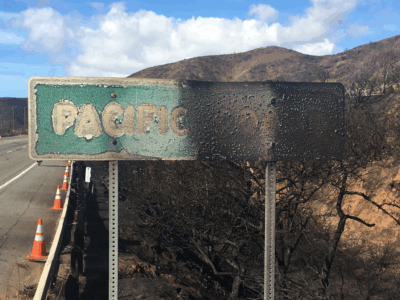NAFTA tribunal strikes a blow for mining regulation by U.S. states
The U.S. and the State of California have been cleared of liability in a widely-watched NAFTA case involving mining regulations. A foreign mining company challenged the legality of California regulations that prevented a proposed environmentally- and culturally-destructive gold mine from being built in California’s Imperial Valley. The company, Glamis Gold Ltd, a Canadian company (now Goldcorp), filed the claim seeking $50 million in compensation from the U.S. after California issued regulations in 2003 that would have made it impossible for the proposed gold mine to operate profitably. (Disclosure: I worked on this issue as a Deputy Attorney General for the State of California in the early part of this decade.)
Back in the 1990s, Glamis took advantage of the U.S. Mining Law of 1872 to accumulate mining claims in California’s Imperial Valley desert lands. Glamis proposed to mine large amounts of rock containing tiny concentrations of gold in that area through a “cyanide heap-leach” process. (This is pretty much what it sounds like: enormous quantities of rock are dug out of the ground and piled into a heap, and cyanide is poured on top in order to extract gold from the pile.) Under the company’s proposal, over 400 tons of rock would have to be mined in order to extract each ounce of gold.
The mining proposal was located on federal land managed by the Bureau of Land Management (BLM), and its operation would have affected threatened desert ecosystems, consumed hundreds of millions of gallons of water annually, and adversely affected the spiritual practices of the Quechan tribe, which considers the area sacred and central to their religious practice. The mining plan would have left an enormous pit and an enormous pile of waste rock at the end of its two decades of operation.
In the Clinton administration, the U.S. Department of Interior, under then-Secretary Bruce Babbitt, recommended disapproving the mine because of the likelihood that it would cause “unnecessary and undue degradation” of BLM’s land, violating the Federal Land Policy and Management Act. After George W. Bush took office, the Interior Department reversed course and indicated that it would not consider the mine’s proposed practices to constitute unnecessary and undue degradation, essentially green-lighting the mining proposal. (This High Country News story from 2001 describes the background and the controversy surrounding the about-face.)
But in 2003, the California Board of Mining and Geology passed new regulations that require open-pit mines such as the one proposed by Glamis to completely backfill the pits they leave and to restore the original contour to the landscape, eliminating both the waste rock pile and the hole that otherwise would be left behind. The Glamis mine, and others like it, were the clear target of these regulations. It’s pretty clear that this requirement would have made Glamis’s project unprofitable.
The situation raised an interesting question of the limits of California’s power to regulate mining on federal lands. (See the U.S. Supreme Court case California Coastal Commission v. Granite Rock Company for an authoritative, though very unsatisfying and vague, explanation of the relationship between state and federal authority in a similar situation.) But instead of attempting either to move forward to develop its mine or to challenge the validity of California’s regulation in U.S. courts, Glamis filed a claim in 2003 under the North American Free Trade Agreement (NAFTA). According to the U.S. State Department’s summary of the case:
Glamis claims that certain federal government actions and California measures with respect to open-pit mining operations resulted in the expropriation of its investments in violation of Article 1110, and denied its investments the minimum standard of treatment under international law in violation of Article 1105. The California measures include regulations requiring backfilling and grading for mining operations in the vicinity of Native American sacred sites. Glamis claims damages of not less than $50 million.
The decision is not yet available, but according to news reports and the State Department, the three-judge NAFTA arbitration panel rejected Goldcorp’s claim earlier this week. According to the State Department’s media release, the panel (which included Berkeley law professor David Caron) “held that the actions and measures in question were supported by legitimate public policy goals and did not violate the minimum standard of treatment provision of the NAFTA or constitute an expropriation of Glamis’ investment.”
The full decision will be available soon at this link. And the Quechan tribe’s take on the decision is here.
Goldcorp still owns the mining claims at issue. It’s still possible that it will try to move forward either with an appeal of the NAFTA tribunal’s decision, a legal challenge in U.S. courts, or even a new mining plan.
What is truly remarkable is that the 1872 Mining Law still facilitates development of mining projects such as this one. Keep in mind that Goldcorp never had to pay for the right to mine on federal land. Its NAFTA claim, and its claim of a right to conduct heap-leach mining, are based on basic principles in the Mining Law that allow companies to claim mining rights on public land without having to purchase or lease them from the government. Fortunately, California law and this NAFTA tribunal have ensured that at least for now, the mine won’t be approved and U.S. taxpayers won’t have to compensate Goldcorp for having failed in its attempt to get the mine approved.
Reader Comments
3 Replies to “NAFTA tribunal strikes a blow for mining regulation by U.S. states”
Comments are closed.







How often do the NAFTA panels find in favor environmental regulations? The only other one I remember is the Methanex case.
I assume that when and if Goldcorp files a challenge in federal court, you will post the answer to the exam question.
Professor Hecht,
How will this affect the CAFTA case between El Salvador and Pacific Rim Gold Mining Co., which also deals with changes in mining laws and a parallel FTA expropriation provision?
http://www.miamiherald.com/business_monday/story/1018403.html
http://www.pacrim-mining.com/i/pdf/2009-04-30-CAFTA.pdf
Sherry
Thanks for your comments.
Jon: I’m not following these comprehensively, but Methanex is the only other one I’m aware of.
Sherry: I’m not an expert on NAFTA or CAFTA procedure, or on the factual or legal context of the Salvadoran case. And I haven’t seen the opinion in this case yet, so I don’t know the panel’s reasoning. But I believe that this award doesn’t set binding precedent even for future NAFTA arbitrations. On the other hand, I think awards such as this one provide important context for future disputes – if the reasoning is applicable or analogous, that reasoning may inform future decisions.